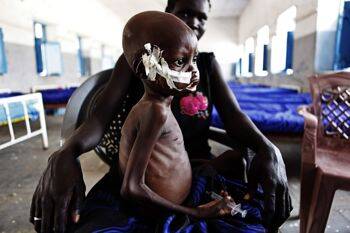The bishop of Tombura-Yambio, Southern Sudan, urged the United States to use whatever diplomatic means it can to pressure the government of President Omar al-Bashir to end its attacks on civilians in South Kordofan state. Bishop Eduardo Hiiboro Kussala said the danger of war is great if troops from the North continue their attacks in an attempt to control key areas along the unresolved border between Sudan and Southern Sudan, due to become independent July 9.
"There are many terrible scenarios that are pointing to war," Bishop Kussala said June 16 prior to testifying about the situation in Southern Sudan to the House Foreign Affairs Subcommittee on Africa, Global Health and Human Rights. "We are scared. We want the American community to prevent us, to not go back to war."
While sporadic conflicts began soon after residents of Southern Sudan voted overwhelmingly to secede from Sudan in a January referendum, the violence intensified in May as government troops from the North sought to control key areas in South Kordofan, which borders the oil-rich states of Unity and Upper Nile.
The most recent government violence has targeted the Nuba people around Kadugli, the South Kordofan capital, with witnesses reporting Sudanese troops going door-to-door to hunt down the opposition. Attacks in May centered on Abyei, farther to the south, near the undefined border. Abyei is home primarily to members of the Dinka Ngok tribe, supporters of the government of Southern Sudan.
Sudan and Southern Sudan must resolve several key issues in order to carry out all of the provisions of the 2005 Comprehensive Peace Agreement and prevent full-scale war, the bishop explained.
He pointed to several unresolved concerns:
-- Defining the border between the two countries.
-- Citizenship for residents in the disputed regions.
-- The split of revenues from oil reserves, which are largely located in Southern Sudan.
The issues "are like a time bomb. If we don't fulfill these things, we are likely to go back into more conflict. South Sudan, even getting independence, could be immediately thrown into war," Bishop Kussala said.
The Catholic Church in the region has called for al-Bashir to open key roadways to allow humanitarian aid to reach the tens of thousands of internally displaced people who have fled the violence. The United Nations estimates that 60,000 people have fled Kadugli alone.
"The humanitarian situation is deplorable," Bishop Kussala said. "A lot of people have been displaced. A lot are running for their lives in the villages in the forest. So we have a huge, huge need for humanitarian assistance.
"The church's role, of course, in this is to bring into light the situation of these people and ask for support from whoever can come to the aid of these people. More than this is also fear of the continuation of violence in the Nuba Mountains and in Southern Kordofan. If it continues it's going to become uncontrolled and it could throw the whole country into violence," he said. "So I've come to appeal to the Congress, and say 'Look, there's no time to waste. It's the moment to seize and be able to stop what's going on because the more it continues, it could easily draw the other warring parties in Sudan into violence.'"
Bishop Kussala also called upon U.S. Catholics to pray for peace in the region and for the future of Southern Sudan so that the day of independence will mark the historic start of a country that supports human rights and upholds the dignity of all.








